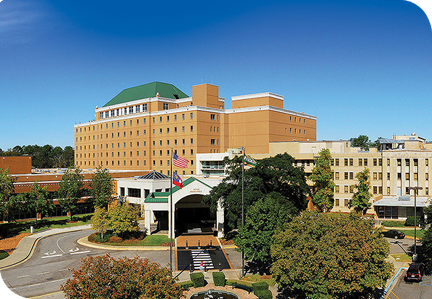The hospital in Albany – the state’s epicenter for COVID-19 — reported Monday that it has had nine more deaths from the virus, bringing its total to 25.
Eight of the deaths at Phoebe Putney were patients suspected of having the coronavirus who passed away over the past week, and their test results came back positive for the virus within the past day, hospital officials said. One patient who tested positive died overnight, officials said.

The hospital’s coronavirus deaths make up about one-fourth of the state’s total of 102 that health officials reported at 7 p.m. Monday. More than 3,000 COVID-19 cases now have been reported in Georgia.
Greater Albany has a higher rate of infections than any metro area in the nation other than New York City, the New York Times reported last week.
The spread of COVID-19 in the southwest Georgia city has been linked to two funerals there — one in late February and the other in early March — that drew large crowds.
Phoebe Putney still has 55 patients confirmed with the disease, while another 73 are in the hospital awaiting test results.
“Unfortunately, we know these will not be the final deaths from this virus in our community, as we continue to see a growing number of critically ill patients,’’ Dr. Steven Kitchen, chief medical officer at Phoebe Putney Hospital, said Monday in a statement. “We can’t stress enough the need for everyone in southwest Georgia to follow restrictions put in place by local governments to avoid close contact with others.”
Phoebe Putney was among several major hospital systems that sent a letter to Gov. Brian Kemp last week, asking him to create ‘‘further restrictions’’ that can curb the spread of COVID-19.
The letter, obtained by GHN through an Open Records Request, commended the governor for taking his initial steps Monday. Those included ordering the shutdown of bars and nightclubs in Georgia, and requiring medically fragile individuals, including those in long-term care facilities, to “shelter in place.’’
The governor also banned gatherings of 10 or more people ‘‘unless you can maintain at least six feet between people at all times.’’
Kemp, though, stopped short of a wider set of restrictions such as governors in some states have ordered. Certain cities and counties in Georgia, meanwhile, have imposed their own, stricter requirements.
The letter, dated March 24 and co-signed by CEOs from Piedmont Healthcare, Emory Healthcare, Wellstar Health System, Grady Health System, and Northeast Georgia Health System, noted that COVID-19 needs human interaction to spread.

“As a result, the solution is simple but challenging – Georgians need to stay home,’’ the hospital CEOs’ letter said. “By staying home, isolating our households as much as possible, we can slow down the spread of this infection. It literally will save lives.’’
Scientific models show the number of infected Georgians ‘‘will grow exponentially without this level of intervention,’’ the letter said.
The models show that hospitals and doctor offices “will be overwhelmed and forced to make difficult choices regarding care in just two weeks unless we do something more,’’ the letter continued.
“Further, we ask you to continue your efforts to ensure we have the personal protective equipment, testing supplies, and cleaning products we need. Many of us have defaulted to making our own supplies. We are all in this together and we are asking for your help.
“Thank you for your leadership and for considering this vital request.’’
Kemp defended his partial shelter-in-place order in a town hall meeting Thursday. “I’m having to govern the whole state,” he said. “We still have over 50 counties that don’t have a confirmed case yet. We’re trying to balance that.”
When asked about the letter from the hospital groups last week, Kemp’s health policy adviser, Ryan Loke, told GHN that the governor “recognizes the challenges that our hospital systems face.’’
‘‘We are working with those hospitals each and every day to ensure that they have the tools, resources, and state backing to combat the virus,’’ Loke said. “We have seen communities take their own actions in response to the virus.’’
He added that the governor has said there are still “arrows in the quiver” in terms of a state response.

Dr. Carlos del Rio, an Emory infectious disease expert, said that based on a reliable scientific model, the COVID-19 cases in Georgia may peak around April 22.
“I was disappointed that the governor didn’t order a stay-at-home for the entire state,’’ del Rio said, but he added that actions that Kemp took so far will be helpful.
“I think the state government is actually doing the right thing,’’ he said. “I wish it had been done earlier, but that doesn’t mean it can’t be effective.’’

